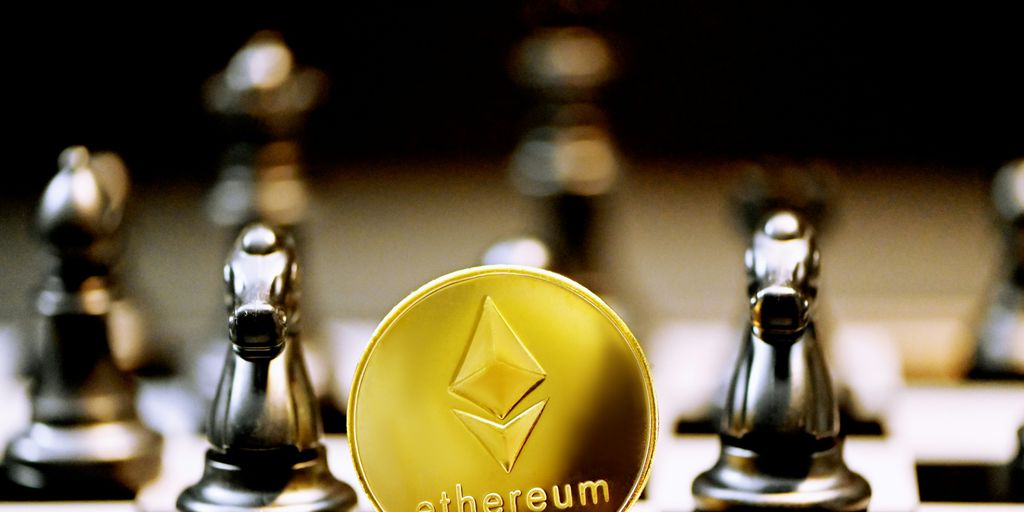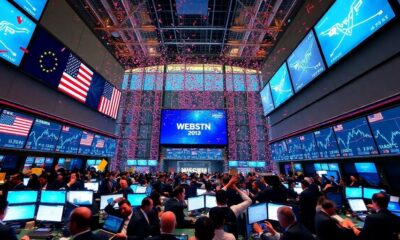Alternative Energy
The Future of Blockchain Gaming Platforms

The landscape of blockchain gaming is rapidly evolving, with many exciting trends and innovations shaping its future. As more companies embrace this technology, players can expect a gaming experience that not only entertains but also empowers them through ownership and participation. This article explores the key trends, challenges, and opportunities that lie ahead in the world of blockchain gaming.
Key Takeaways
- Blockchain gaming is on the rise, with Web3 technology enabling players to own their in-game assets.
- Investment in blockchain gaming is booming, with significant funding flowing into the sector.
- Challenges such as technical issues and regulatory hurdles need to be addressed for wider adoption.
- New business models, including play-to-earn and play-to-own, are transforming how games generate revenue.
- Traditional gaming companies are increasingly entering the blockchain space, bringing new ideas and innovations.
Emerging Trends in Blockchain Gaming Platforms
Rise of Web3 Gaming
The emergence of Web3 gaming is transforming the gaming landscape. Players now have more control over their in-game assets, thanks to blockchain technology. This shift allows for a more engaging experience, where players can truly own their digital items.
Integration of NFTs in Games
NFTs are becoming a crucial part of gaming. They enable players to buy, sell, and trade unique in-game items. This integration not only enhances player engagement but also creates new revenue streams for developers. Here are some key points about NFTs in gaming:
- Ownership: Players can own their items, unlike in traditional games.
- Trading: Players can trade items with others, creating a vibrant marketplace.
- Interoperability: NFTs can be used across different games, increasing their value.
Decentralised Decision-Making
Decentralised decision-making is another exciting trend. Players can now participate in game development and governance, making their voices heard. This trend promotes a sense of community and shared ownership.
The future of gaming lies in decentralisation, where players have a say in the games they love.
In summary, the emerging trends in blockchain gaming are reshaping the industry, offering players new opportunities and experiences. As these trends continue to develop, we can expect a more engaging and player-centric gaming environment.
Investment and Funding in Blockchain Gaming
Major Investors and Their Impact
The blockchain gaming sector has attracted significant attention from major investors. In August 2022 alone, investments reached $748 million for developing new Web3 crypto games. This influx of capital is expected to drive innovation and growth in the industry.
Recent Fundraising Successes
In 2022, Animoca Brands, a leading gaming company, raised over $565 million. This funding is crucial for developing new games and enhancing existing platforms. The table below highlights some recent fundraising successes:
| Company | Amount Raised | Year |
|---|---|---|
| Animoca Brands | $565 million | 2022 |
| Dapper Labs | $250 million | 2021 |
| Mythical Games | $150 million | 2021 |
Future Investment Projections
Looking ahead, the blockchain gaming market is projected to grow significantly. Estimates suggest it could reach between $65 to $90 billion by 2030. This growth will likely be driven by:
- Increased adoption of NFTs
- Innovative business models
- More investment in blockchain technologies
The future of blockchain gaming looks promising, with new opportunities emerging for developers and players alike. As the industry evolves, it will reshape how games are created and monetised, offering players more control over their digital assets.
Overall, the investment landscape in blockchain gaming is vibrant, with major players recognising its potential. As the sector matures, it will continue to attract funding and innovation, paving the way for a new era in gaming.
Challenges Facing Blockchain Gaming Platforms

Technical Limitations
Despite the potential of blockchain gaming, many players face technical hurdles. Setting up a crypto wallet can be confusing for newcomers, making it hard for them to dive into these games. Developers also need to learn how to connect their games to blockchain networks, which can be a steep learning curve.
Regulatory Concerns
The gaming industry is under scrutiny from regulatory bodies. Many games struggle to incorporate blockchain elements due to fears of legal issues. Developers must ensure their NFTs and in-game currencies comply with regulations, or they risk facing penalties. This adds an extra layer of complexity to game development.
Scalability Issues
As a game gains popularity, the number of transactions increases. Blockchain games can encounter scalability problems if they do not use the right technology. They need to choose distributed ledger technologies (DLTs) that offer low fees and high transaction speeds to handle the growing demand effectively.
Blockchain gaming is still evolving, and while it offers exciting opportunities, it also presents significant challenges that developers must navigate.
Summary of Challenges
| Challenge | Description |
|---|---|
| Technical Limitations | Difficulty in setting up wallets and connecting games to blockchain networks. |
| Regulatory Concerns | Legal scrutiny over NFTs and in-game currencies. |
| Scalability Issues | Problems with handling increased transaction volumes as games grow in popularity. |
Innovative Business Models in Blockchain Gaming
Play-to-Earn (P2E) Models
Blockchain gaming has introduced exciting new ways for players to earn while they play. In P2E models, players can earn cryptocurrency or NFTs through gameplay. This model has become very popular, with many games allowing players to trade their in-game assets for real money. Here are some key points about P2E:
- Players can earn rewards by completing tasks or winning battles.
- The value of in-game assets can fluctuate based on market demand.
- P2E games have attracted millions of players, leading to significant trading volumes.
Play-to-Own (P2O) Models
In contrast to P2E, the P2O model focuses on giving players true ownership of their in-game assets. This means players can buy, sell, or trade their items freely. Some examples include:
- Loaded Lions: Mane City: A tycoon-style game where players build businesses.
- Reign of Titans: A strategy game featuring unique Titan characters as NFTs.
- Players can create value from their gameplay experiences.
Hybrid Models Combining Traditional and Blockchain Gaming
Many developers are now blending traditional gaming with blockchain elements. This hybrid approach allows for:
- Familiar gameplay mechanics while introducing blockchain features.
- Enhanced player engagement through unique digital assets.
- New revenue streams for developers by integrating NFTs and cryptocurrencies.
The future of gaming is evolving, and business models in blockchain gaming are at the forefront of this change. As players gain more control over their assets, the gaming landscape will continue to transform.
The Role of NFTs in Blockchain Gaming
Digital Ownership and Trading
Non-fungible tokens (NFTs) are unique digital assets that represent ownership of items in the gaming world. These tokens allow players to truly own their in-game items, such as skins, characters, and weapons. Unlike traditional games, where items are often locked to a player’s account, NFTs can be traded or sold on various platforms, giving players more control over their digital possessions.
Interoperability Across Games
NFTs can be used across different games, allowing players to transfer their assets from one game to another. This interoperability enhances the gaming experience by enabling players to use their favourite items in multiple environments. For example, a character skin from one game could be used in another, creating a seamless experience for gamers.
Impact on Game Design
The introduction of NFTs has changed how games are designed. Developers are now creating games that incorporate NFT mechanics, which can lead to new gameplay experiences. Here are some key points about this impact:
- Increased player engagement: Players are more likely to invest time in games where they can earn and trade valuable assets.
- New revenue streams: Developers can monetise their games through NFT sales, creating a sustainable business model.
- Enhanced creativity: The ability to create unique, tradable items encourages developers to think outside the box.
The rise of NFTs in gaming is reshaping how players interact with their favourite titles, making ownership and trading a central part of the experience.
In summary, NFTs are revolutionising the gaming landscape by providing players with true ownership, enabling cross-game compatibility, and influencing game design. As the technology continues to evolve, we can expect even more innovative uses of NFTs in the gaming industry.
Security and Transparency in Blockchain Gaming
Enhanced Player Security
Blockchain technology provides an extra layer of security for players. By using encrypted ledgers, it helps keep player account information safe from hackers. This means that sensitive data, like personal details and transaction history, is much harder to access without permission.
Secure Transactions
In blockchain gaming, every transaction is recorded on a public ledger. This ensures that all interactions are verified and legitimate. Players can trade items or earn rewards with confidence, knowing that their transactions are secure. Here are some key points about secure transactions:
- Each transaction is recorded, preventing fraud.
- Players can trade items without fear of duplication.
- The system guarantees that no one is paid twice for the same service.
Immutable Records
One of the best features of blockchain is that it creates immutable records. This means that once a transaction is made, it cannot be changed or deleted. This transparency helps build trust among players. They can see the history of their transactions and know that their in-game assets are safe.
Blockchain gaming is transforming how players interact with digital assets, making the gaming experience more secure and transparent.
Conclusion
In summary, blockchain gaming platforms are leading the way in enhancing security and transparency. With features like encrypted ledgers, secure transactions, and immutable records, players can enjoy a safer gaming experience. As the industry grows, these elements will become even more crucial for attracting new players and retaining existing ones.
The Future of On-Chain Gaming
Fully Decentralised Games
The future of gaming is leaning towards fully decentralised games. These games will allow players to have complete control over their assets and decisions. With the rise of blockchain technology, players can expect:
- True ownership of in-game items.
- The ability to trade assets freely.
- A community-driven approach to game development.
Revenue Projections
The blockchain gaming sector is projected to grow significantly. By 2030, the revenue is expected to reach $73 billion. This growth will be driven by:
- Increased player engagement.
- Adoption of innovative business models.
- Expansion of the NFT market.
Technological Advancements
Technological improvements will play a crucial role in the future of on-chain gaming. Key advancements include:
- Enhanced scalability solutions to support more players.
- Improved user interfaces for better accessibility.
- Integration of AI and VR for immersive experiences.
The future of on-chain gaming promises to reshape the gaming landscape, offering players more control and opportunities than ever before.
As we look ahead, the potential for blockchain gaming to transform the industry is immense, paving the way for a new era of gaming experiences.
Traditional Gaming Companies Entering the Blockchain Space

Case Studies of Major Companies
Several traditional gaming companies are now exploring the blockchain space. Notable examples include:
- Ubisoft: Initially faced backlash with its NFT initiative, Ubisoft Quartz, but has since partnered with Immutable IMX for new blockchain games.
- Electronic Arts (EA): Has expressed strong support for blockchain technology, calling it the future of gaming.
- Square Enix: Showed interest in integrating NFTs into popular game series, although player reception has been mixed.
Partnerships and Collaborations
The trend of partnerships is growing, with companies looking to leverage blockchain technology. Some key collaborations include:
- Ubisoft and Immutable IMX: Aiming to create engaging blockchain games.
- Animoca Brands and Hedera: Focused on enhancing play-to-earn activities and addressing cheating issues in games.
- Electronic Arts and various blockchain developers: Exploring innovative gaming experiences through blockchain.
Market Reception and Challenges
While the interest in blockchain gaming is rising, challenges remain:
- Scepticism from Players: Many gamers view blockchain initiatives as cash grabs, leading to a cautious reception.
- Technical Barriers: Developers face hurdles in integrating blockchain technology effectively.
- Regulatory Concerns: Companies must navigate complex regulations surrounding NFTs and cryptocurrencies.
The entry of traditional gaming companies into the blockchain space signifies a shift in the industry, but success will depend on addressing player concerns and simplifying blockchain concepts.
As the landscape evolves, the potential for innovative gaming experiences is vast, but companies must tread carefully to win over traditional gamers.
Enhancing User Experience in Blockchain Games
Simplifying Blockchain Jargon
To make blockchain gaming more accessible, it is essential to simplify the complex terms often associated with it. Here are some ways to achieve this:
- Use clear language: Avoid technical jargon and explain concepts in simple terms.
- Provide tutorials: Offer easy-to-follow guides for new players.
- Create visual aids: Use infographics to explain processes and features.
Focus on Fun and Engagement
The primary goal of any game is to be enjoyable. Blockchain games should focus on creating engaging experiences that keep players coming back. This can be done by:
- Designing captivating storylines and characters.
- Incorporating interactive elements that encourage player participation.
- Regularly updating content to keep the game fresh and exciting.
User-Friendly Interfaces
A smooth and intuitive interface is crucial for enhancing user experience. Here are some key features to consider:
- Easy navigation: Ensure players can find what they need without confusion.
- Responsive design: Make sure the game works well on various devices, including mobile.
- Customisable profiles: Allow players to create and manage their profiles easily.
Blockchain gaming has the potential to revolutionise the gaming experience, but it must prioritise user-friendliness to attract a broader audience.
By focusing on these aspects, blockchain gaming platforms can significantly enhance the overall user experience, making it more enjoyable and accessible for everyone.
Virtual Events and Tournaments in Blockchain Gaming
Organising and Managing Events
Virtual events and tournaments are becoming essential in the gaming world. They allow players from all over the globe to compete without needing to be in the same physical location. Here are some key points about organising these events:
- Decentralised Platforms: Using blockchain technology, event organisers can create platforms that are secure and transparent.
- Prize Distribution: Blockchain helps in tracking and distributing prizes fairly, ensuring that winners receive their rewards without delay.
- Community Engagement: These events foster a sense of community among players, encouraging interaction and collaboration.
Reward Verification
One of the challenges in traditional gaming tournaments is verifying rewards. Blockchain technology simplifies this process:
- Immutable Records: Every transaction is recorded on the blockchain, making it easy to verify who won and what they earned.
- Transparency: Players can see the entire history of transactions, ensuring fairness in the competition.
- Reduced Fraud: With secure records, the chances of cheating or disputes over rewards are significantly lowered.
Impact on the Gaming Community
The rise of virtual events and tournaments has a profound impact on the gaming community:
- Increased Participation: More players can join from anywhere, leading to larger tournaments.
- Skill Development: Players can improve their skills by competing against others from different backgrounds.
- Networking Opportunities: Gamers can connect with others, leading to potential collaborations and friendships.
The integration of blockchain in gaming events is not just a trend; it’s a revolution that enhances player experience and trust.
Overall, virtual events and tournaments in blockchain gaming are reshaping how players interact, compete, and earn rewards, making the gaming experience more engaging and secure.
The Impact of Blockchain Gaming on the Broader Gaming Industry
Market Growth and Projections
The gaming industry is experiencing a significant transformation due to blockchain technology. In 2023, the global gaming market is expected to reach $187.7 billion, with a growth rate of +2.6% year-over-year. By 2030, blockchain gaming alone could grow to between $65 to $90 billion. This growth is driven by:
- Increased investment in blockchain games
- Adoption of NFTs
- Innovative business models
Adoption by Traditional Gamers
While blockchain gaming has attracted many crypto enthusiasts, traditional gamers are still cautious. However, as more games incorporate blockchain features, we can expect:
- Greater acceptance of digital ownership
- Enhanced security and transparency in transactions
- New opportunities for earning through gameplay
Future Trends and Predictions
The future of blockchain gaming looks promising. As more companies explore this technology, we can anticipate:
- A rise in Web3 gaming, which offers players ownership of in-game assets
- More partnerships between traditional gaming companies and blockchain platforms
- Continued innovation in game design and monetisation strategies
Blockchain gaming is not just a trend; it represents a new era in how games are developed and played. The integration of blockchain technology is set to redefine the gaming landscape, offering players more control and opportunities than ever before.
| Year | Global Gaming Market Size | Blockchain Gaming Market Size |
|---|---|---|
| 2023 | $187.7 billion | $3 billion |
| 2030 | N/A | $65 – $90 billion |
Conclusion
In summary, the outlook for blockchain gaming is very promising. As more companies start to explore this technology, we can anticipate a rise in games and platforms that incorporate blockchain features. Web3 gaming is set to transform the gaming landscape by giving players ownership of their in-game assets and a say in decisions, moving away from a single controlling authority. Significant investments are flowing into this sector, with reports indicating that $748 million was invested in new Web3 games in August 2022 alone. While blockchain gaming may not change the quality of games, it will create new financial opportunities within them. The technology will enable secure payments and ownership of digital items, enhancing the gaming experience. Brands must innovate and provide unique gaming experiences, including NFTs that promote trading and interoperability. As the industry evolves, it is crucial for developers to simplify the gaming experience and focus on fun to attract a broader audience. The future of blockchain gaming is bright, and with the right approach, it could redefine how we play and interact with games.
-

 Home and Garden5 days ago
Home and Garden5 days agoTransform Your Space: A Guide to Minimalist House Interior Design in 2025
-

 Home & Family5 days ago
Home & Family5 days ago10 Essential Cleaning Hacks for Bathroom Surfaces You Need to Try
-

 Health & Fitness6 days ago
Health & Fitness6 days agoDiscovering the Best Multivitamin for Women Over 40: Essential Nutrients for Optimal Health
-

 Crime5 days ago
Crime5 days agoExploring the Most Anticipated New True Crime Documentaries of 2025
-

 Health & Fitness5 days ago
Health & Fitness5 days agoDiscover the Best Multivitamin for Women Over 40: A Comprehensive Guide to Optimal Health
-

 Automotive4 days ago
Automotive4 days agoUnlocking Performance: Why the HP Spectre x360 is the Ultimate 2-in-1 Laptop for 2025
-

 Business6 days ago
Business6 days agoMaximize Your Earnings with American Express High Yield Savings Accounts in 2025
-

 Artificial Intelligence6 days ago
Artificial Intelligence6 days agoBreaking Generative AI News: Innovations Shaping the Future of Technology






































